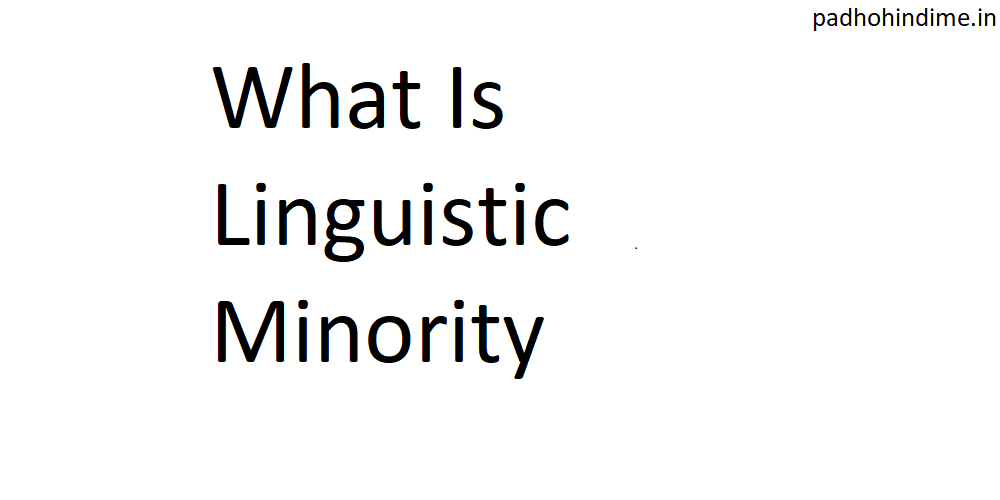What Is Linguistic Minority.
A linguistic minority refers to a group of people within a larger population who share a common language that is different from the majority language spoken by the majority of the population. These linguistic minority groups face unique challenges and experiences that can affect their cultural identity, social integration, educational opportunities, and political representation. In this extensive explanation, we will delve into the concept of linguistic minorities, their characteristics, the reasons for their existence, their significance in society, the issues they encounter, and the measures taken to protect their linguistic rights.
Introduction to Linguistic Minorities:
Linguistic minorities are an essential aspect of cultural diversity and multilingualism within societies. They are present in various parts of the world, and their existence is shaped by historical, geographical, and sociopolitical factors. These minorities often have their distinct cultural practices, traditions, and identities, which are closely tied to their language. Linguistic minorities can be found in regions with diverse linguistic landscapes, such as countries with multiple official languages or areas with a history of immigration and colonization.
Characteristics of Linguistic Minorities:
- Language: The defining characteristic of a linguistic minority is the use of a language that differs from the dominant or majority language spoken in a particular region or country.
- Numerical Size: Linguistic minorities are typically smaller in numbers compared to the majority population. The size can vary significantly, ranging from a small community to substantial linguistic groups.
- Cultural Identity: Language plays a pivotal role in shaping the cultural identity of linguistic minority groups. Their language serves as a symbol of their heritage, traditions, and shared history.
- Territorial Concentration: In some cases, linguistic minorities may be concentrated in specific regions or enclaves, where their language and culture are more prevalent and preserved.
Reasons for the Existence of Linguistic Minorities:
- Historical Factors: Linguistic minorities often trace their roots back to historical events like migrations, invasions, and colonialism. The imposition of dominant languages during these periods may have led to the suppression of minority languages.
- Geography and Isolation: Remote or isolated communities might have maintained their distinct languages and cultures over time, even when surrounded by majority language speakers.
- Immigrant Communities: Immigration patterns can lead to the formation of linguistic minority groups within a country. Immigrants may preserve their native languages and pass them on to future generations.
- Administrative Borders: The drawing of administrative boundaries can result in linguistic minority groups residing in specific regions or provinces.
- Political and Economic Power: The concentration of political or economic power in certain regions may marginalize linguistic minorities, leading to the dominance of a particular language and culture.
Significance of Linguistic Minorities:
- Cultural Diversity: Linguistic minorities enrich a society’s cultural diversity by contributing unique languages, traditions, and perspectives.
- Preservation of Heritage: They play a crucial role in preserving cultural heritage, including traditional knowledge, customs, and oral histories.
- Language Vitality: Linguistic minorities contribute to linguistic diversity, which is vital for maintaining the world’s language ecosystem.
- Enrichment of Literature and Arts: Minority languages often have vibrant literary and artistic expressions that add to the global cultural tapestry.
Challenges Faced by Linguistic Minorities:
- Language Endangerment: Many linguistic minorities are at risk of language endangerment due to factors like language shift, assimilation, or limited intergenerational transmission.
- Education: Access to quality education in minority languages may be limited, impacting the academic performance and cultural identity of minority students.
- Social Discrimination: Linguistic minorities can face discrimination or marginalization based on their language, leading to reduced opportunities and social exclusion.
- Lack of Political Representation: In some cases, linguistic minorities may not have adequate political representation, hindering their ability to advocate for their rights.
- Economic Disparities: Economic opportunities may be limited for linguistic minorities, leading to disparities in income and employment.
Protecting Linguistic Minority Rights:
- Recognition and Promotion: Governments can officially recognize minority languages and actively promote their use in various domains, including education, media, and public services.
- Bilingual Education: Implementing bilingual or multilingual education programs can help preserve minority languages while ensuring students have access to mainstream education.
- Language Revitalization Efforts: Initiatives to revitalize endangered languages through language classes, cultural events, and media support can be essential in preserving linguistic diversity.
- Anti-discrimination Laws: Legal measures can be introduced to protect linguistic minorities from discrimination and ensure their rights to access services and opportunities are upheld.
- Participation and Representation: Encouraging linguistic minorities’ participation in political processes and providing adequate representation can lead to inclusive policies.
Conclusion: Linguistic minorities play a critical role in shaping the cultural mosaic of societies worldwide. They face challenges in preserving their languages and cultural heritage, but protecting their rights and promoting linguistic diversity is essential for fostering a more inclusive and tolerant world. Recognizing the value of linguistic minorities and taking proactive measures to support and preserve their languages will enrich humanity’s cultural legacy for generations to come.




